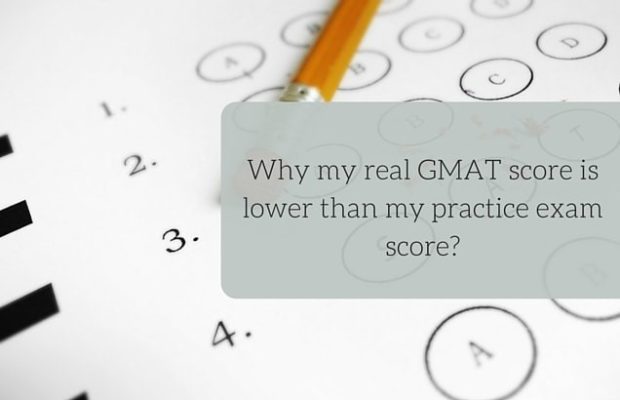Hopefully, once you’ve done a couple of GMAT practice tests, nothing will surprise you on test day. That includes your official GMAT score. But what does it mean if your official GMAT score doesn’t measure up to your practice tests? Keep reading, and we’ll troubleshoot.
First, don’t panic.
It’s fine to take the GMAT twice. It’s fine to take the GMAT three times! If you do better next time, your schools will see that as a positive. If you do worse, you can just cancel your score, and nobody will be the wiser.
Why did this happen?
Here are a few other things to think about:
• Did you sleep well the night before the test?
• Were you hungry? Too warm or too cold? Sick? Stressed? Feeling scared or pessimistic?
• Did you go into the test feeling burned out?
• What did you do in the week before your test? Did you try to cram in a bunch of new material? Or did you relax and review what you knew?
You’re repeating the GMAT Prep practice tests
The bottom line: even a few repeated questions can completely change your experience on the GMATPrep tests, because you’ll feel less time-pressured, and your score will certainly inflate at least a little bit.
So please be really, really thoughtful about how you use those GMAT Prep tests. If you need to repeat them, that’s OK – but don’t trick yourself into thinking that your scores on repeated GMATPrep tests are accurate. Because they probably aren’t.
You’re fundamentally inconsistent
You won’t like this story very much, either.
More importantly, these test scores clearly belong to a wildly inconsistent test-taker, and that’s a huge problem. The key to the GMAT isn’t cramming tons of knowledge into your head; it’s figuring out how to apply CONSISTENT techniques and reasoning habits every single time you see a particular type of question.
If your GMAT Prep test scores are all over the place, they’re trying to tell you something: you fundamentally lack consistency and you’re applying different techniques at different moments, depending on your mood or the direction of the wind. Until your performance is consistent, there’s no reason to expect a great GMAT score – and it shouldn’t surprise you if your test-day performance is much lower than your best GMATPrep practice tests.
So be honest with yourself: until your practice results are CONSISTENTLY in your target range, it’s unlikely that you’ll earn the score you want on the actual GMAT.
You’re fatigued on test day
In a perfect world, you’ll feel exactly the same in the GMAT exam room as you do when you’re taking a GMAT Prep exam in the comfort of your own home. But that’s not realistic: you’ll likely be amped on your test day, and your adrenaline will probably be flowing.
If fatigue was an issue for you on test day, maybe you need to do more full practice tests, or it might help to practice with some extra-hard LSAT materials, just to build up your stamina. Or maybe more sleep or a better test-day diet would help. Or you could always choose a different section order, so that the least-important sections come at the end of your exam. But test-day fatigue is definitely a very fixable problem.
The first step to a better second GMAT is figuring out why the first one didn’t go well. The second step is doing something about it, then taking the test a second time and crushing it!







